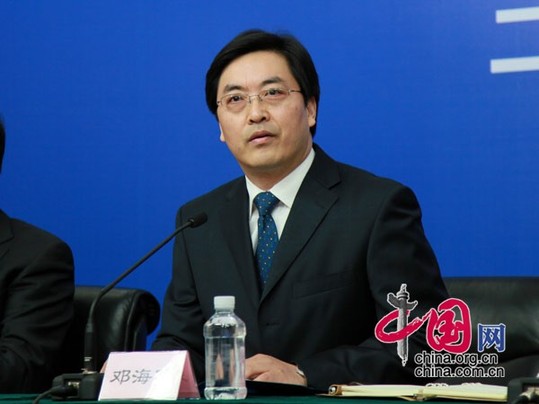Vaccines involved in 3 children's illness
 |
|
Deng Haihua |
China's Ministry of Health Tuesday confirmed that three children had fallen ill in connection to vaccines in the northern Shanxi Province, but it denied the vaccines were problematic.
Among the 15 children named in media reports, two had reported adverse reactions caused by vaccines, but one had only a mild reaction, said Deng Haihua, the ministry's spokesperson, at a press conference in Beijing.
The effects of a vaccine could not be ruled out in connection with the illness of another child, he said.
"The causes of illness of the other 12 children were not related to vaccines," Deng said.
Under Chinese law, vaccine recipients can claim compensation for adverse reactions that have serious effects on their health.
On March 17, the Beijing-based China Economic Times, run by the Development Research Center of the State Council, reported almost 100 children had died or fallen ill in Shanxi after receiving vaccines supplied by Beijing Huawei Company, a contractor of the provincial health department.
The report cited Chen Tao'an, a whistleblower who worked with the Shanxi Center for Disease Control and Prevention (CDC) in 2007.
The report named 15 children among 78 who had received vaccines for encephalitis, hepatitis B, rabies and other illnesses at different times. Four children died in 2007 and 2008, and 74 were sickened, according to the report.
The ministry sent an investigation team to Shanxi from March 19 to April 1. They had examined the medical histories of the 15 children, interviewed 11 children reported to be sick and talked with relatives of the four dead children, Deng said.
The causes of death of the four children were not related to vaccines. One died of encephalitis, one died of epilepsy and the other two deaths were suspected to have been caused by encephalitis and central respiratory failure, he said.
Two types of vaccines are available to Chinese. The first the state purchases for compulsory vaccinations and provides for free to the public. The second is elective and must be paid for by individuals. Any qualified vaccine producer can supply them with the approval of provincial health departments.
Beijing Huawei Company was a supplier of the second type of vaccine in Shanxi from 2005 to 2007.
The investigation team did not find problems with the vaccines supplied by Beijing Huawei Company, he said.
The incidence of diseases against which people can be vaccinated was no higher in Shanxi than the national level from 2006 to 2008, and nor was the incidence of adverse reactions to vaccines higher than average, he said.
"But there were problems in the management of vaccines when the provincial CDC worked with Beijing Huawei Company," he said.
Deng said, the company had attached labels to vaccine packages without approval. According to regulations, any written introductions and logos on vaccine packages must be approved by the State Food and Drug Administration (SFDA).
The China Economic Times report said the provincial CDC and the company exposed the vaccine packages, whch should be kept refrigerated, to room termperature for prolonged periods while they attached labels reading "For Shanxi CDC only."
The labels were introduced after Beijing Huawei won the contract to become the sole provider of elective vaccines for Shanxi health authorities.
The spokesman did not confirm the reports.
Feng Zijian, director of the emergency response department of the national CDC, told the press conference that brief exposure of vaccines to room temperatures was inevitable and harmless, but keeping vaccines out of cold storage for "a long time" was forbidden.
Deng said the ministry and the SFDA were working with the provincial government in a continuing investigation into the Shanxi CDC and Beijing Huawei Company.
On March 23, Ju Xianhua, deputy secretary general of Shanxi provincial government, said former director of the provincial CDC Li Wenyuan had violated rules while cooperating with the vaccine supplier, and was accused of embezzling 270,000 yuan from the company's 500,000-yuan safety guarantee deposit.
Li ceased to be head of the provincial CDC at the end of last year and an investigation into his activities was underway, said Ju.
Go to Forum >>0 Comments
 Add your comments...
Add your comments...
- User Name Required
- Your Comment
- Racist, abusive and off-topic comments may be removed by the moderator.
 0
0 






